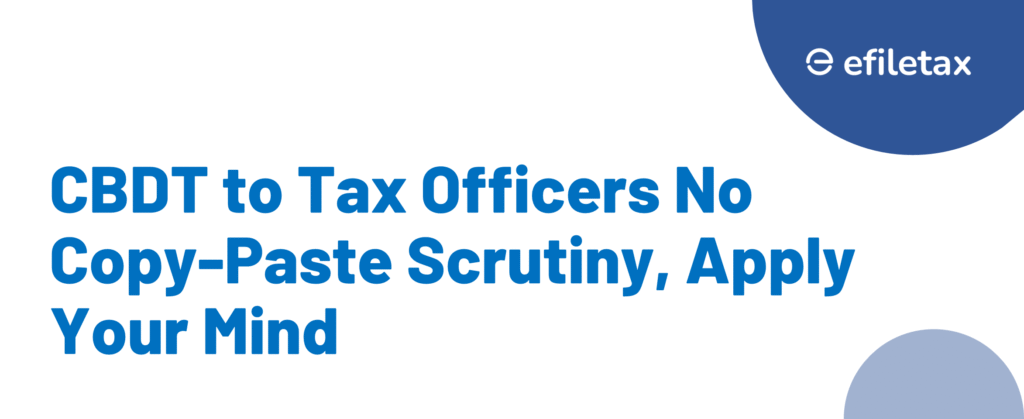
CBDT Tightens Scrutiny Norms: Officers Must Apply Mind, Avoid Generic Queries
In a significant move aimed at restoring taxpayer confidence, the Central Board of Direct Taxes (CBDT) has issued clear instructions to its officers: stop issuing irrelevant or vague scrutiny notices. This directive ensures that only specific, reasoned questions are raised during scrutiny under the Income-tax Act, 1961.
Why the Directive Matters
The CBDT, through Letter F. No. 225/66/2024/ITA-II dated 25.06.2025, reminded field officers of their duty to:
- Apply proper mind before issuing notices
- Avoid cut-copy-paste or bulk questions irrelevant to the taxpayer’s case
- Ensure that queries are linked to flagged risk areas
This is in line with Standard Operating Procedure (SOP) guidelines under the Faceless Assessment Scheme and judicial precedents which call for reasoned assessments.
Key Takeaways from CBDT’s Instructions
No More Blanket Queries
- Notices should not include generic questions not connected to the case
- Avoid bulk questioning based on old formats
Link Queries to Risk Parameters
- Each scrutiny case is selected for a specific reason/risk flag
- Officers must state that reason in the notice
- Questions must relate directly to that reason
Mandatory Application of Mind
- Officers must read the case file
- Cannot rely solely on system-generated formats
- Responsibility lies with Jurisdictional AO even under faceless or centralised systems
Legal and Policy Background
- Income-tax Act, 1961 – Section 143(2): Used to serve scrutiny notices
- Faceless Assessment Scheme: Requires transparency, objectivity, and non-intrusiveness
- Delhi HC in Salasar Techno Engineering Ltd v. PCIT (2022): Held that irrelevant scrutiny queries violate principles of natural justice
Expert View: Practical Tip for Taxpayers
“If you receive a scrutiny notice, check if the query matches the reason for selection. If not, you can challenge it under law or seek clarification through the e-Proceedings portal.”
— CA Manish S, Tax Litigation Advisor
What Should Taxpayers Do?
Here’s a quick checklist:
| Step | Action |
|---|---|
| 1 | Check for the reason of scrutiny in the notice |
| 2 | Ensure all queries relate to that reason |
| 3 | Maintain records, submit only relevant information |
| 4 | Use the e-Proceedings portal for online reply |
| 5 | If queries are irrelevant, flag them with proper representations |
FAQs on Scrutiny Notices
Q1. Can I ignore a scrutiny notice if it seems vague?
A: No. You must respond, but you can object to irrelevant queries in your reply.
Q2. What if the officer doesn’t state the reason for scrutiny?
A: You can request clarification via the portal. CBDT has mandated that the reason must be disclosed.
Q3. Will faceless scrutiny change this process?
A: No. These guidelines apply even under the faceless regime. In fact, it strengthens safeguards for taxpayers.
Summary Snippet (for Google):
CBDT directs tax officers to avoid irrelevant scrutiny notices and ensure all queries are specific, linked to the case, and based on risk flags. This boosts transparency in faceless assessment.
Conclusion
The CBDT’s latest directive marks a positive shift in the scrutiny process — from broad fishing expeditions to case-specific queries backed by reason. This is a welcome move for honest taxpayers and a step towards fairer tax administration.
👉 Need help replying to a scrutiny notice or e-assessment?
Get expert assistance with Efiletax now
Sources & References
- CBDT Letter dated 25.06.2025 (F. No. 225/66/2024/ITA-II)
- Income-tax Act, 1961 – Section 143(2)
- Salasar Techno Engineering Ltd v. PCIT (Delhi HC, 2022)